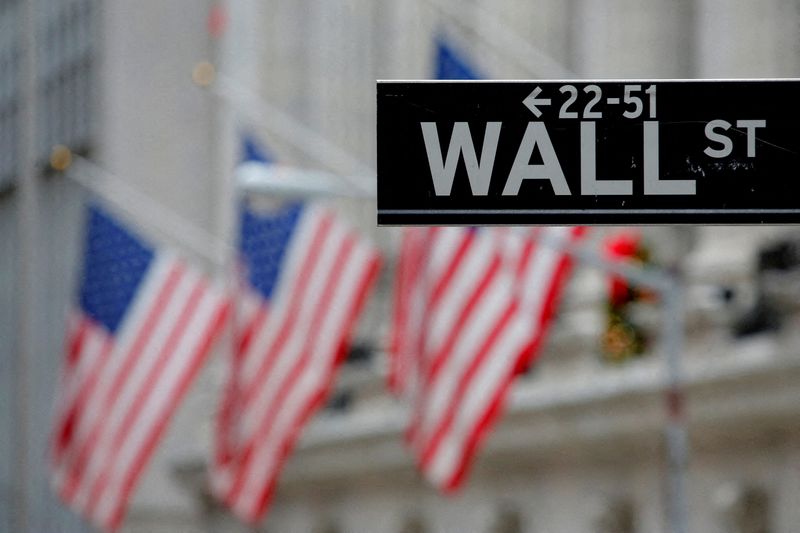By Lewis Krauskopf
NEW YORK (Reuters) -The rally in U.S. stocks is wobbling as it confronts a stretch of potentially market-shaking events, starting next week with corporate results from tech titans and the closely watched employment report, while the U.S. election is also nearing.
The benchmark is up about 22% on the year, but has edged back from record-high levels in recent days.
Still, equities remain at elevated valuations, which could make stocks vulnerable should any of the near-term market events fall short of expectations.
The S&P 500’s price-to-earnings ratio, based on earnings estimates for the next 12 months, is at 21.8, near its highest level in over three years, according to LSEG Datastream.
“People will be on pins and needles for most of next week,” said Peter Tuz, president of Chase Investment Counsel Corp. “The market is expensive … Any time you have an elevated market the potential for a bigger downdraft exists if something disappointing happens.”
Five of the “Magnificent Seven” group of megacap companies that have played a major role in driving the market over the past couple of years are set to report quarterly results next week: Google parent Alphabet (NASDAQ:), Microsoft (NASDAQ:), Facebook owner Meta Platforms (NASDAQ:), Apple (NASDAQ:) and Amazon (NASDAQ:).
Because of their massive market values, those companies jointly account for 23% of the weight of the S&P 500, meaning market reaction to their results could sway broader indexes in coming days.
The Magnificent Seven stocks trade an average forward P/E ratio of 35 times, as the companies overall have posted much stronger profit growth than the rest of the S&P 500. But that gap is expected to close in coming quarters.
“I see a handful of companies that deservedly have very high multiples but if that reason for being deserved falters then there’s a lot of room below for those stocks to fall,” said Bryant VanCronkhite, senior portfolio manager at Allspring Global Investments.
Investors will be looking across these megacap companies to see if their increased spending on artificial intelligence capabilities is starting to show benefits.
AI “hyperscalers” — Microsoft, Amazon, Alphabet and Meta — are set to increase capital expenditures by 40% this year, while such capex spending for the rest of S&P 500 companies are on pace to fall 1% in 2024, according to BofA Global Research.
Tesla (NASDAQ:), the first of the Magnificent Seven to report results, saw its shares surge on Thursday after CEO Elon Musk said he expects vehicle sales to grow 20% to 30% next year.
Next week is the busiest week of the third-quarter reporting season overall, with well over 150 S&P 500 companies set to post results.
The U.S. jobs report on Nov. 1 comes as investors are weighing whether a stronger-than-expected economy could lead to fewer interest rate cuts by the Federal Reserve than initially anticipated.
Economists expect the employment report to show that the economy created 140,000 jobs in October, according to Reuters data. The report could be “messy” in the wake of two significant storms, but the wages data will be important to watch, said Nanette Abuhoff Jacobson, global investment strategist at Hartford Funds.
“If we saw an uptick in wages, that would be concerning,” Jacobson said. “The bond market is already getting a whiff of possibly stronger growth than expected, possibly inflation rearing its ugly head again, and the possibility of the Fed not being able to ease as much as what’s priced in.”
Benchmark Treasury yields climbed to three-month highs this week, reflecting expectations of a potentially less dovish Fed as well as possibly increased spending under the next president. Bets on Donald Trump prevailing have risen on prediction markets in recent weeks, with the Republican seen as backing policies including tariffs that could lead to higher inflation.
The run of market-sensitive events continues the following week, with Election Day on Nov. 5 and the Fed’s next monetary policy decision on Nov. 7, which could put investors increasingly on edge in the coming days.
The Cboe Volatility Index, an options-based indicator of demand for protection from market swings, was last around 19, after edging below 15 late last month.

“Investors should expect market volatility in the lead-up to the U.S. presidential election,” analysts at UBS Global Wealth Management said in a note on Thursday. As Nov. 5 “inches closer, market sentiment is likely to stay vulnerable.”
text_section_type=”notes”>Wall St Week Ahead runs every Friday. For the daily stock market report, please click [.N]